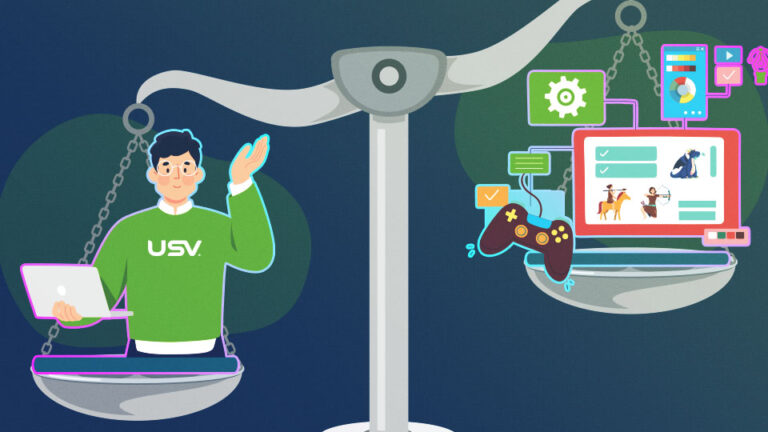There’s a wealth of knowledge to absorb in the vast and sometimes daunting world of audio, both in music theory and business. Navigating this labyrinth of information is no easy task. Yet, it’s essential for anyone who wants to make it in the competitive, challenging, but extremely rewarding world of professional audio.
Going to school for digital audio prepares you with the tools and knowledge to succeed in audio production. It’s a prime opportunity to network as you make numerous connections throughout the course of your college career, gaining professional touchpoints which are essential to finding your way into your first paid gig.
How Do I Get a Job in the Audio Industry?
Earning your degree in digital audio technology with a concentration in audio and music production is an easy way to get on the right track to becoming a professional audio expert. It’s a time-tested way of breaking into an industry where it’s challenging to find opportunities. Once you’ve earned your degree, you’ll be able to prove to others that you have what it takes: that you have the discipline and expertise to handle professional-level audio production.
What Do You Learn During a Digital Audio Technology Degree Program?
With a digital audio technology degree, you get a curriculum that’s concentrated on the very skills you’ll need to perform professional digital audio production.
provide you with comprehensive audio tech training, allowing you to walk away with a well-rounded audio education upon graduation. In addition to the raw skills and knowledge, pursuing audio technology academically gives you valuable life experience that’s important for your success. For some, there isn’t a replacement for the engagement and interaction that the classroom setting provides.
You will traverse the many layers of audio science broken down for you comprehensively by experienced, professional educators. You will learn firsthand how to manage complex recording sessions and receiving tips and tricks of the trade for keeping dense multilayered tracks clean and clear.
Comprehensive Lesson Plans
The content of a course like this truly runs the gamut, covering everything from digital files to cable management. Even if a class includes concepts that seem like minor or irrelevant things to include in an audio technology course, rest assured that if they’re included in an accredited school’s program, these are core parts of the job.
If you’ve never worked in the world of audio before, you may find out that there are skills and logistical steps central to the audio engineering process that you didn’t expect to be involved in the work. There are likely parts of the job that you might not be able to learn by just reading about it from a textbook or webpage.
That’s why these courses are designed to give you the kind of hands-on lessons that prepare you for the real world of working in the audio industry. You’ll start with the basics and use those as a foundation to advance on to higher concepts, building up your experience level with each step you take.
Every lesson relates clearly to your future career path, so it’s easy to see why you’re studying each topic. You’ll have the distinct sense that what you’re learning is leading you directly to a thriving audio career, something that serves as a powerful motivator to wholeheartedly pursue your studies and truly put your all into it.
Education Through Engagement
Participating in a digital audio technology program puts you in a highly immersive environment. You have numerous peers to collaborate with, enriching your audio aspirations and broadening your perspective. All the while, you’re building friendships that make for a more engaging and memorable experience.
You’ll have fun while learning and earning your degree. This is largely thanks to the teachers and administrators in charge of designing the courses: educators and audio wizards who really know what they’re talking about and have the experience to back it up. These teachers will also be there to mentor and guide you throughout the process of working towards your audio and music production college degree.
When you study digital audio technology with an emphasis on production, you’ll be creating sub-mixes and studying mix automation, with the end goal of managing your own full-cycle studio production. By the time you’ve completed the last phase of your education, audio mastering, you’ll be at the level where you can fully record and produce audio in just about any subsect of the industry.
Professional-Level Tools
Going to school for audio production puts you in an environment where you’re generating your own sounds using state-of-the-art tools and equipment. This includes highly expensive and sometimes hard-to-find gear that most aspiring audio professionals wouldn’t be able to get their hands on otherwise.
In these courses, you are given a deep dive into the realm of editing digital audio and mixing tracks using industry-standard DAWs (digital audio workstations) like Logic and Pro Tools. You also learn how to enhance the texture of your mixes by adding incredible depth of texture and building highly immersive soundscapes that take your listeners on a journey using such tools as Pure Data, Native Instruments Komplete, and Tassman.
This is all part of the fundamentals of desktop production, the modern way of making music. You’ll get a strong introduction into this brave new world of audio in an audio technology program, starting with the software you’ll be using throughout both your education and career paths
You’ll learn the different techniques and practices that every audio professional must know, as well as the everyday housekeeping tasks that these experts need to learn.
Designed for Your Comfort
The various classes in an audio technology degree program help you become comfortable with handling waveform and synthesizing sound digitally. By the end, you’ll be familiar with the software plug-ins that make the audio production of today possible.
Working digitally gives you access to a massive library of synthesized instruments, which opens up a whole new world of opportunity for you. But it’s essential that you’re able to navigate these exciting new powers that you wield, because it’s all too easy to get lost in the sea of information and become overwhelmed by the many options you’re now faced with.
It doesn’t take much for beginners diving into digital audio production to become fully immersed. You can truly lose the essence of your craft to the complexity of the tools you’re working with if you don’t know how to manage them. And for such complex audio production tasks as designing your own digital instrument and filters, it takes training from accredited and experienced educators to learn how to use these tools effectively.
Putting Your Skills to the Test
Studying for a digital audio technology degree means enjoying highly interactive coursework taught by professors that provide you with input on every step of your educational journey. This means getting valuable feedback that helps you form your knowledge base and gain a real sense of how you’re doing.
You’ll be putting your new skills to use right away with the hands-on learning approach in various classes, focusing on the practical applications of each lesson. You will use your newly learned skills and methods to create real projects such as interactive media that you will forever have as a part of your professional portfolio.
Where Can You Work with a Digital Audio Technology Degree?
If you thrive in diversity, you’ll love the incredibly varied work environment that comes with a job in audio tech. You never have two similar days because there’s always something different to try and new venues to explore. These ventures become lucrative and career-building business opportunities that are so enjoyable, you might forget you’re technically at work. Digital audio technology experts are all around you if you know where to look:
- Music studios
- Theaters
- Movie sets
- Video game studios
- Sound effects studios
- Live music venues
- Home studios
In short, if you’re a professional digital audio producer, you have many work choices. Once you’ve acquired the skills and built up your career, you’ll have more and more freedom to work the way you want.
The more you do, the better-known you become, making it all the easier to land a better job. If you choose to be a freelancer, you’ll have the ability to work as much or as little as you want. But once you become popular enough, there’s sure to be countless people requesting your services, and sometimes it’s just hard to say no.
Are you ready to get a job in the audio industry? University of Silicon Valley empowers aspiring audiophiles to master their craft. Our Audio and Music Technology Department students are exposed to new ideas and industry-grade equipment and are presented with challenges designed to unlock their creativity.
University of Silicon Valley is uniquely poised to offer a meaningful and valuable education for 21st century students. We believe in an education that directly correlates with the work you’ll be doing after you graduate. Interested in learning more? Contact Us today.


